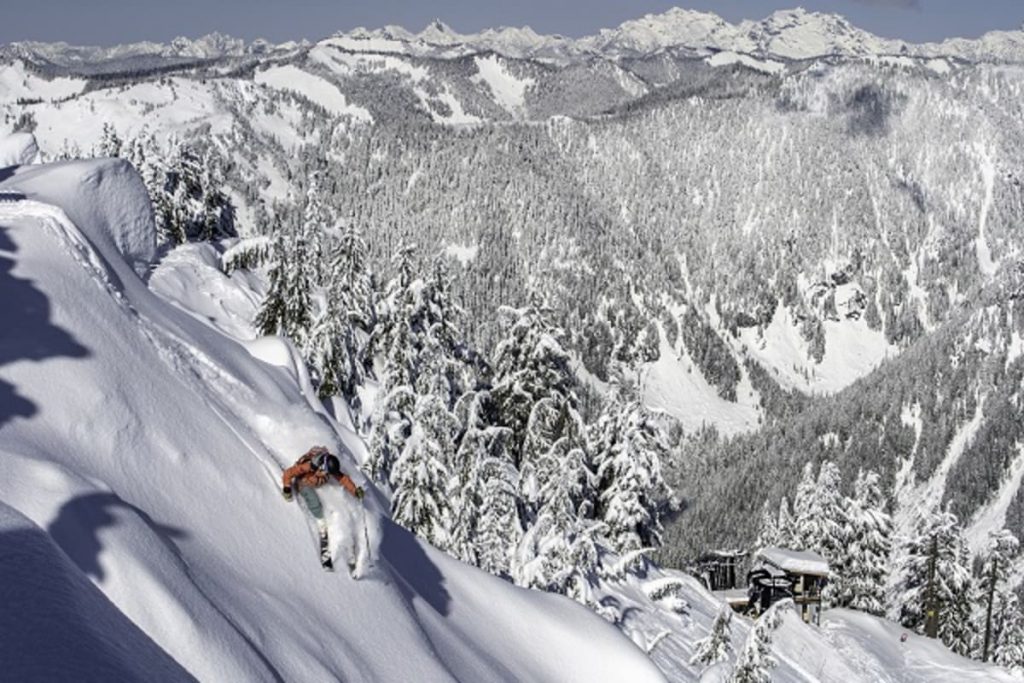By Eric Smith
A dearth of snow at Pacific Northwest ski areas wreaked havoc on Vail Resorts Inc.’s skier visit totals through January 5, but the Broomfield, CO-based company maintained its EBITDA guidance for the fiscal year thanks to improving conditions at the affected resorts and strong pass sales across its footprint.
Vail on Friday reported season-to-date total skier visits were down 7.8 percent compared to the prior year season-to-date period, primarily due to soft numbers at Whistler Blackcomb in British Columbia and Stevens Pass in Washington—areas that saw meager snowfall to kick off the 2019/2020 season.
However, total lift ticket revenue for the season-to-date, including an allocated portion of season pass revenue for each applicable period, was up 0.4 percent compared to the prior-year season-to-date period.
“Relative to the strong conditions in the prior year, the 2019/20 North American ski season got off to a slower start, impacting both our local and destination guest visitation in the pre-holiday period through December 19, 2019,” said Rob Katz, Vail’s CEO.
He added that excluding Whistler Blackcomb and Stevens Pass, Vail’s two properties in the Pacific Northwest, “results improved over the holiday period between December 20, 2019, and January 5, 2020, compared to the prior-year holiday period, delivering growth in total skier visitation and across all revenue lines, which were in line with our expectations.”
Whistler Blackcomb’s snowfall sunk to a 30-year low through December 31, 2019, but some recent storms have boosted the resort, which now has nearly all of its terrain open, Katz said.
In a Friday note to investors, Tyler Batory of Janney Montgomery Scott LLC detailed exactly how well things have improved at Whistler Blackcomb.
Batory tracks all trail openings at Vail’s properties, and he noted that as of December 21, 2019, only 36 trails were open out of 240, compared with 102 on the same date in 2018 and 143 on the same date in 2017.
However, he added, “Coming out of the New Year, trail openings saw a strong ramp up and are back to normal levels.” As of January 16, Whistler had 238 trails open, compared with 224 the same date in 2019 and 177 the same date in 2018.
The company should be able to weather the storm, so to speak. Shares of Vail Resorts (MTN) were actually up at market close Friday, the same day Vail’s disappointing skier visit totals were released.
Brett Andress of KeyBanc Capital Markets wrote in a note to investors: “We view [Friday’s] metrics update as slightly below relatively heightened expectations of late. While [Vail] faced the lowest recorded snowfall in the last 30 years at Whistler, encouraging holiday period trends across the remainder of the portfolio were good enough for [Vail] to reiterate and characterize the FY20 guide as within the original range. Overall, despite [Vail]’s diversification benefits showing its merits, we expect a mixed reaction to [Friday’s] update, as season-to-date metrics were largely uninspiring, and we would expect shares to remain range bound pending greater clarity around near-term snow trends.”
Vail maintained the guidance it announced when the company reported fiscal fourth-quarter earnings on September 26.
Katz outlined the guidance in his prepared comments at the time: “Net income attributable to Vail Resorts, Inc. is expected to be between $293 million and $353 million for fiscal 2020. We estimate Resort Reported EBITDA for fiscal 2020 will be between $778 million and $818 million.
“Our Resort Reported EBITDA guidance includes an estimated contribution of $53 million for Peak Resorts operations, including an estimated $6 million benefit from not incurring offseason losses from August 1, 2019, through the closing date of September 24, 2019. The company expects to incur approximately $20 million of acquisition- and integration-related expenses in fiscal 2020 related to the acquisitions of Peak Resorts, Falls Creek and Hotham.”
Andress wrote in his note that Vail is assuming normal conditions for the remainder of the ski season to hit those EBITDA targets, but some risks remain, including below-average snowfall, negative external factors impacting leisure travel and/or consumer confidence and competitive threats such as Alterra Mountain Co., whose Ikon Pass has grabbed share from Vail’s suite of Epic products.
The company’s stock (MTN) gained 13 cents, or 0.1 percent, to $249.44 at market close Friday. Markets are closed Monday in observance of Martin Luther King Jr. Day.
Photo courtesy Stevens Pass Ski Resort
















